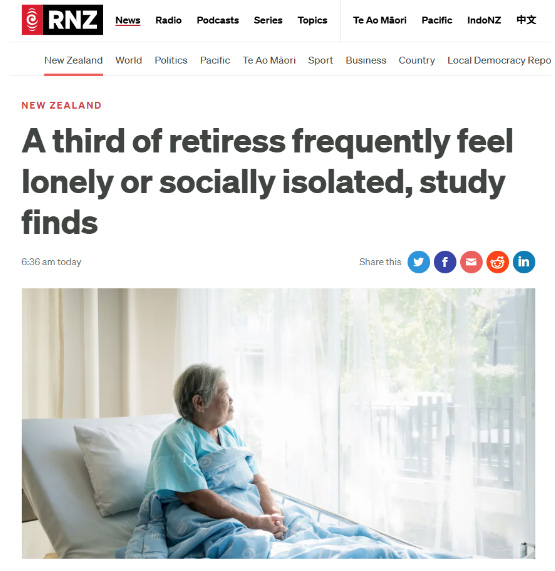Loneliness and Isolation Among Older New Zealanders Reach Epidemic Levels – Research
This content was written by Impact PR on behalf of Age Concern Auckland. The New Zealand public relations agency’s campaign was covered by multiple news titles, including TVNZ, NZ Herald, RNZ, and more.
The impact of loneliness and social isolation on the wellbeing of older New Zealanders has reached concerning proportions, according to a newly released study.
The findings from this report have prompted health advocates to urge the New Zealand government to establish a Ministerial lead for Loneliness, akin to roles already in place in the United Kingdom and Japan.
Commissioned by Age Concern Auckland, the “Breaking Barriers” study explores the emerging healthcare crisis among New Zealand’s growing demographic of people aged 65 and older, with data gathered from respondents across Auckland and the Bay of Plenty.
The study reveals that 59% of participants reported recent experiences of loneliness or social isolation, with nearly a third of these respondents feeling lonely frequently or almost constantly.

The authors of the report describe a complex picture of interconnected issues contributing to loneliness, characterising it as a ‘hidden epidemic’ impacting older adults’ physical and mental health. Key drivers include financial insecurity, as rising living costs and limited retirement savings place pressure on many older people. Health challenges also factor heavily, with long wait times for elective surgeries and rising health insurance costs fostering anxiety and limiting social engagement.
Another significant factor is the lack of access to appropriate and affordable housing, with findings indicating that many older New Zealanders are priced out of the housing market, often living in substandard conditions or in homes ill-suited to their needs. About 70% of those residing in social housing reported experiences of loneliness, the highest rate among all housing types surveyed.
The report also highlights how globalisation and shifting family dynamics have exacerbated social disconnection. In Auckland, 44% of older residents are migrants who originally moved to join family but find themselves isolated when loved ones move abroad.
In addition, technology has proven to be an ineffective solution for loneliness; three-quarters (75%) of those who use social media reported feelings of isolation. Among older people who consider themselves proficient with smartphones, nearly two-thirds (64%) still felt lonely. Researchers suggest that while technology provides connection, it can exacerbate loneliness if not paired with face-to-face interactions.

Kevin Lamb, CEO of Age Concern Auckland, compares the health impact of loneliness to that of chronic medical conditions, calling for governmental action.
“The level of loneliness and social isolation among older New Zealanders has a profoundly negative impact on the lives of many vulnerable people,” says Lamb. “This is not just a personal issue; it has societal and health costs comparable to smoking or obesity.”
He emphasises the need for a dedicated Minister for Loneliness in New Zealand to tackle this issue through policy development, community initiatives, and public awareness.
“The research clearly shows loneliness is not a result of personal choices; it stems from broader societal and external factors that leave many older people isolated. Creating a ministerial position to address this hidden epidemic could foster community support, drive national campaigns, and ensure mental wellbeing is prioritised.”
The report’s authors advocate for a holistic response to loneliness among older people, including increased funding for mental health services, social support, and community-based initiatives designed to foster meaningful connections. Recommendations also include promoting age-positive perceptions to combat ageism, as well as establishing volunteer programmes and activities tailored to the diverse interests of older adults.
The research draws particular attention to challenges faced by Māori in rural areas, where access to health and social services is limited. With over a third (34%) of Māori kaumātua living in rural regions, these communities show a higher dependency ratio than urban areas, indicating a need for targeted support for Māori elders.
If you have questions about public relations, contact us today. – we would love to help.
